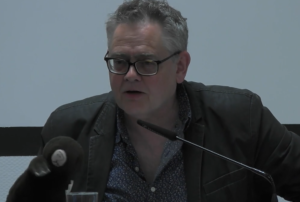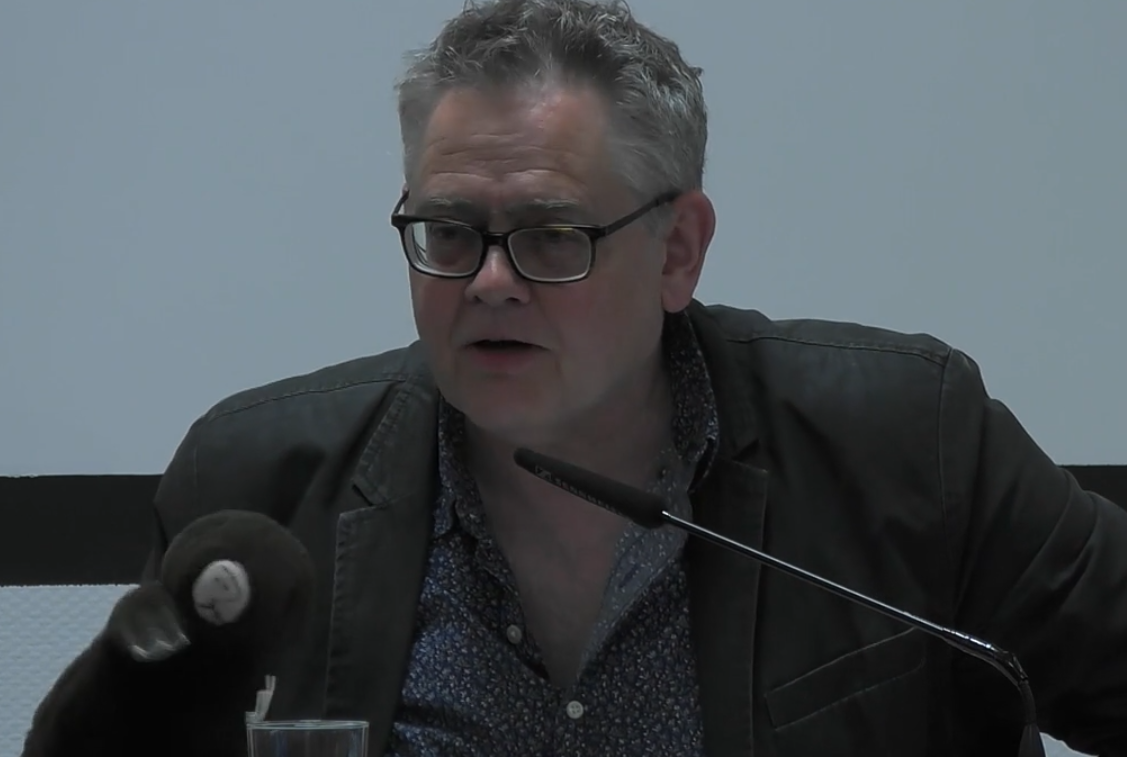
Post-Scriptum America: Trace, Reversibility and Climate Change
The purpose of this panel is to address, post-scripturally, the specifically fossil-fuel driven “motion” referred to in the 2020 AFEA Congress’s “call” (“The history of the United States has been defined by an ideology of motion”). Under the highly problematic equation “Post-America”/ “Post-United States”, “post-” here refers to a consequence (the climate-changed atmosphere) that in large measure originated in an “American way of life” redefined post-scripturally, as in an obsequy, as a dead-end. What if post-scripturality (the structure and genesis of the post-scriptum) writes the narrative with which to comprehend the United States as a Post-United States? What if post-scripturality is the awareness of the results of petro- or fossil-fuel culture?
Jacques Derrida’s essay, “Freud and the Scene of Writing” (1967), introduces the post-scriptum as a concept through the figure of a mole:
The metaphor of the breached path, so frequent in Freud’s descriptions, communicates always with the theme of supplementary postponement and of reconstitution of meaning afterwards, after a mole’s path-making, after the subterranean labor of an impression. This latter left a working trace that has never been perceived, lived in its meaning presently, that is to say, consciously. The post-scriptum that constitutes the past present as such does not, as perhaps Plato, Hegel and Proust thought, merely wake up the past present or reveal it in its truth. The post-scriptum produces the past present.
We posit that climate change is this post-scriptum. The movement of the mole is underground, invisible, until it has already occurred. The underground labor of the impression implies that the work of the trace was itself not perceived, was not conscious. It is only because after the inscription we add a note to it, a post-scriptum, that we know about it. Knowledge comes after the fact. Repetition, the post-scriptum, is what produces the inscription. In that sense, the so-called first time, the moment of the forcing or the tracing (“American motion,” if one will), is only produced by reversibility itself, the backward or reverse movement that constitutes the post-scriptum.
Post-scripturality illuminates our past and present, our “past present.” What we know about fossil fuel extraction over the past 230 years alters what we hitherto thought we knew about these past 230 years, but the production of this new knowledge also erases the knowledge we had about our extractivist period. The post-scriptum, i.e. climate-changed truth, not only produces the past present as truth (of C02 and CH4 on the Keeling Curve), but erases it as truth (of the “ideology of motion”). The truth that is emerging as simultaneously what erases the readability of all our narratives of the past present and what produces a radically different narrative of the past present is baffling; it alters or revises our notions of identity itself no longer defined as based on subjectivity or individuality.
Climate change is the afterword, and the afterward, to an extractivist period. This afterword, and afterward, is the time we live in, the time of the supplement. This afterword, or afterward, requires another foreword and forward: a radical re-writing of history (“post-America”),” a new formulation of what is understood under the name of temporization and under the so-called “non-temporality” of the unconscious. In his essay, Derrida returns to Freud’s “sexual postponement” and the “unconscious” sexual identity of early childhood. We propose that climate change is analogous to this unconscious during the period of fossil-fuel addiction, but unconscious does not mean absolutely repressed. Timothy Clark’s work on emergent unreadability argues that this unconscious does express itself during our past 230 years, especially but not only now from our vantage point. In the case of sexuality, this unconscious is the knowledge of the primitive scene. What is the unconscious knowledge in the case of climate change? The unconscious is only considered or defined as non-temporal by opposition to a common concept of time. This concept of time is mechanical. It is a time understood, dogmatically, in terms of consciousness. If time is redefined according to the movement between an initial happening and its post-scriptural constitution as present, then climate change awareness is to this very unconscious what that non-temporality is to the vulgar concept of time. In other words, climate change awareness is not only today in its obvious conscious manifestations. When it began, it was already in time.
This panel calls for papers that re-read the long nineteenth “American” or United States culture according to this post-scriptum, papers that follow the mole-like traces left by the emergence and installation of fossil-fuel culture. Papers might follow the literary leads from Timothy Clark’s accounts of “emergent unreadability” or “scalar effects” (Clark 2015) that stress how we occupy a “shadowtime,” a time of at least two scales—one the “ideology of motion” we grew up on, the other its incontrovertible revelation as fossil-fuel driven and causing mass extinction (Clark 2019). Or, contributors might want to adapt to “the American scene” Jesse Oak Taylor’s study of British fiction in which climate itself is shown to be an art work, “the sky of our manufacture,” and literary art part and parcel with climate change (Oak Taylor 2016). The tools developed by Clark, Oak Taylor, and others generate “Anthropocene Reading” (Menely, Oak Taylor 2017) for American or U.S. writers across the long 19th century. Other approaches could, following works such as Richard Powers’ The Overstory (2018), study how literature is changing its inheritance from this same 19th century, not only thematically but also in the form literary composition takes. Still other approaches, following historians such as Dipesh Chakrabarty (Chakrabarty 2009, 2019), or earth system scientists (Lewis and Maslin 2018) could return to archives (historical, geological, philosophical) in order to reflect upon how the present anthropogenic climate “catastrophe” was already, year after year after year, recorded in them.
Thomas Dutoit (U Lille)
Cécile Roudeau (U Paris)
cecile.roudeau@gmail.com
dutoitthomas@gmail.com
proposals to be submitted by 31 January 2020
Image: Mole and Nicholas Royle, on Post-Scripts, Mole-logics and Climate-Changed Reading of Literature
full video here: https://webtv.univ-lille.fr/video/10667/keynote-lecture-nicholas-royle-8221fl-reflections-on-life-abbreviated8221



